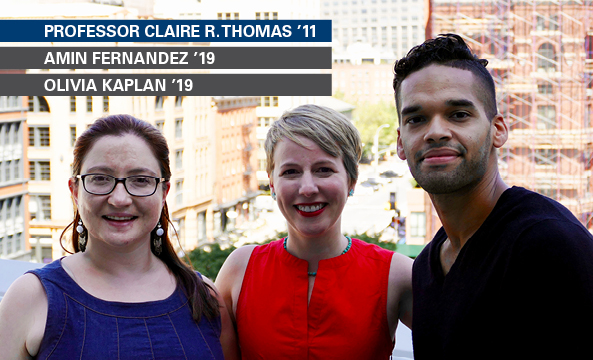
NYLS’s Asylum Clinic has succeeded in securing asylum for M.A., a man who fled Ghana seeking safety in the United States.
In May 2015, M.A. was brutally assaulted by a Ghanaian gang for befriending a gay man, based on the perception that M.A. might be gay himself. The local authorities were unwilling to prosecute the crime. Fearing for his life, M.A. made his way to the U.S. border, where he presented himself and requested asylum.
M.A. passed the first step in the asylum process, a Credible Fear Interview. He was then detained in a facility at the Southern Border for nine months. After unsuccessfully applying for asylum on his own, M.A. filed an appeal and was released on bond. He moved to the Bronx to live with a childhood friend.
M.A. then connected with Cornell Law School’s Asylum and Convention Against Torture Appellate Clinic, which helped him appeal his asylum loss at the Board of Immigration Appeals and before the U.S. Court of Appeals for the Ninth Circuit. This process took years. In August 2018, Cornell’s Clinic was successful, and, as M.A. had requested, his case was transferred to New York Immigration Court for a new trial.
That’s where NYLS students stepped in. Amin Guevarra-Fernandez ’19 and Olivia Kaplan ’19, who were beginning their final year as NYLS evening students, took on the case, with supervision from Clinic Director and Adjunct Professor Claire R. Thomas ’11.
“When we first met our client, he was very reserved,” Guevarra-Fernandez says. “It took a while to get him to open up. He had been through a lot of trauma.”
A language barrier also complicated matters: M.A. only spoke Ghanaian Hausa.
“When we were interviewing him, we had to be watchful for meaning or expression that would get lost in translation,” Kaplan says. “To draft the declaration, we had to ask him about his profoundly traumatic past and act with great sensitivity around issues of sexual orientation and gender identity in the country context.”
After an initial hearing, the team shifted its focus to a mammoth task: writing M.A.’s declaration, a detailed account of his reasons for seeking asylum. That step, which necessitated multiple interviews, gathering medical reports and other evidence, and researching country conditions, would span the entire 2018–19 academic year. In late April 2019, Guevarra-Fernandez and Kaplan were finally ready to submit their filing, but they were far from finished.
The next month was a period of intensive preparation for M.A.’s May 2019 hearing, in which he would testify about his experiences before an immigration judge. He would also be questioned by a U.S. government attorney.
“We went in expecting the worst,” Guevarra-Fernandez says. “We prepared M.A. for hours of testimony. But in the end, the government attorney didn’t put up much of a fight. It was the best outcome we could have hoped for.”
On August 19, more than four years after his immigration journey began, M.A. was officially granted asylum.
“He was so grateful when he heard the decision,” Guevarra-Fernandez says. “Now he can move ahead with his life.”
Both Guevarra-Fernandez and Kaplan, who graduated from NYLS in May, plan to practice immigration law. Guevarra-Fernandez joined The Bronx Defenders’ Immigration Practice this month.
“Taking courses with Professor Thomas definitely guided me toward this,” he says.
Kaplan reflected, “This was my first asylum case ever, and it was an invaluable experience to have right before we graduated. I was definitely inspired by Professor Thomas, and I’m grateful to NYLS.”
Related
